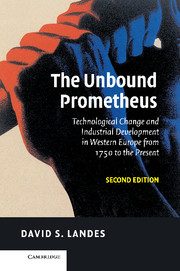 The Unbound Prometheus
The Unbound Prometheus Epilogue
Published online by Cambridge University Press: 05 June 2014
Summary
The Unbound Prometheus was written a third of a century ago. It dealt almost exclusively with Western examples of industrial advance—western and central Europe, the United States, some Russia—for these, together with Japan, were in fact the scenes of development. I would have to use a different subtitle today, for the West is now only part of the story of technological change, which has begun to touch just about the entire world.
The process goes back centuries. Some scholars there are who, disapproving of Western triumphalism or solicitous of Asian (mostly Chinese) pride and prowess, would date the Industrial Revolution late and treat it as lucky accident. It could have happened anywhere, they say; just fell to Europe's or Britain's lot, in large part owing to political fortune. And globalization in the sense of world-wide diffusion of trade, industry and technology supposedly came even later: post-World War II.
Yet the newer research and reflection on comparative world history make it clear that globalization goes back a millennium, back to European economic development in the later Middle Ages, back to the opening of the world with the turning of Africa and penetration of European vessels into Asian waters and to the contemporaneous European invasion of the Americas. The centuries that followed saw the West grow richer than other regions of the world, pull away from the one-time leaders, establish empire in distant lands—all of this on the basis of superior scientific knowledge and industrial technique.
- Type
- Chapter
- Information
- The Unbound PrometheusTechnological Change and Industrial Development in Western Europe from 1750 to the Present, pp. 556 - 565Publisher: Cambridge University PressPrint publication year: 2003
